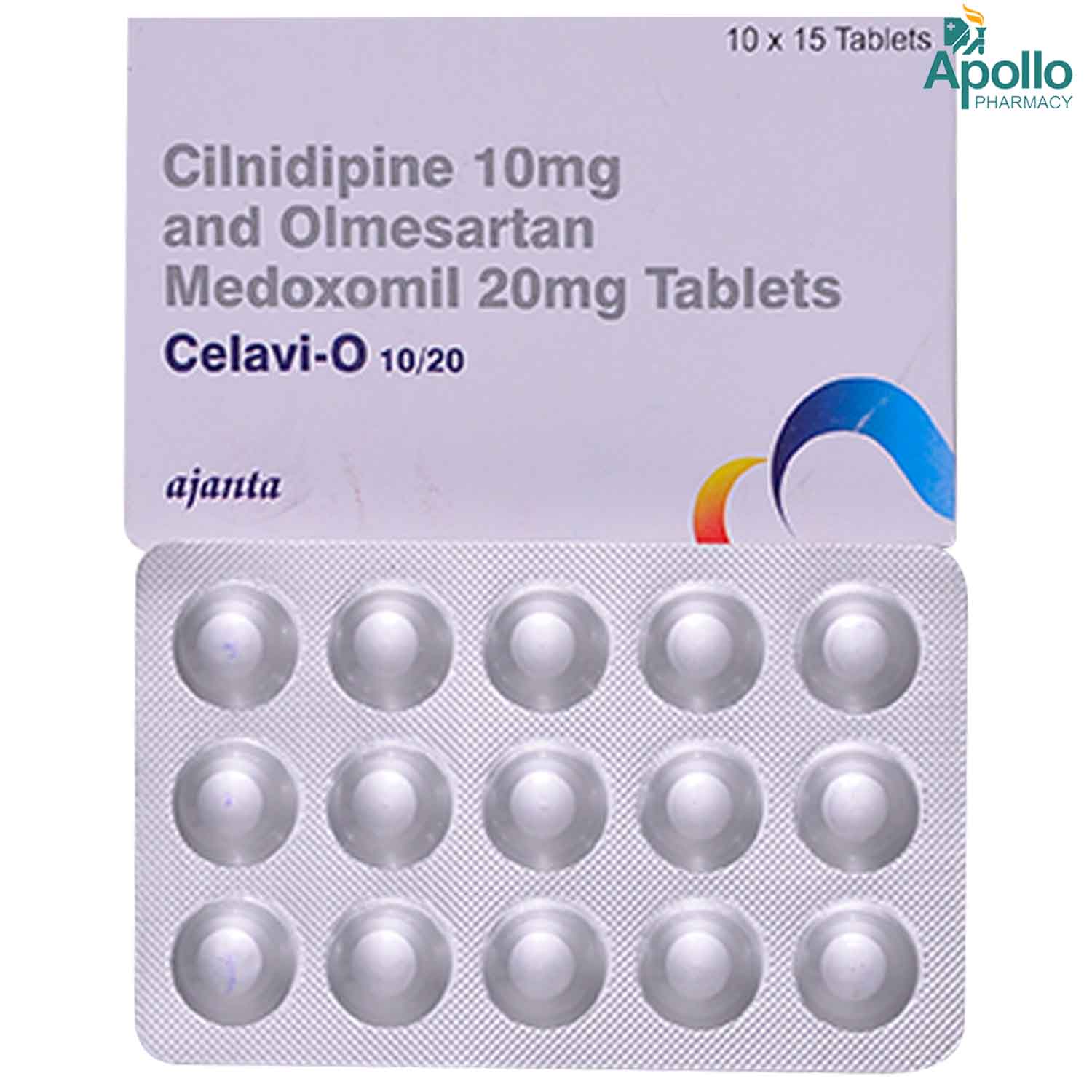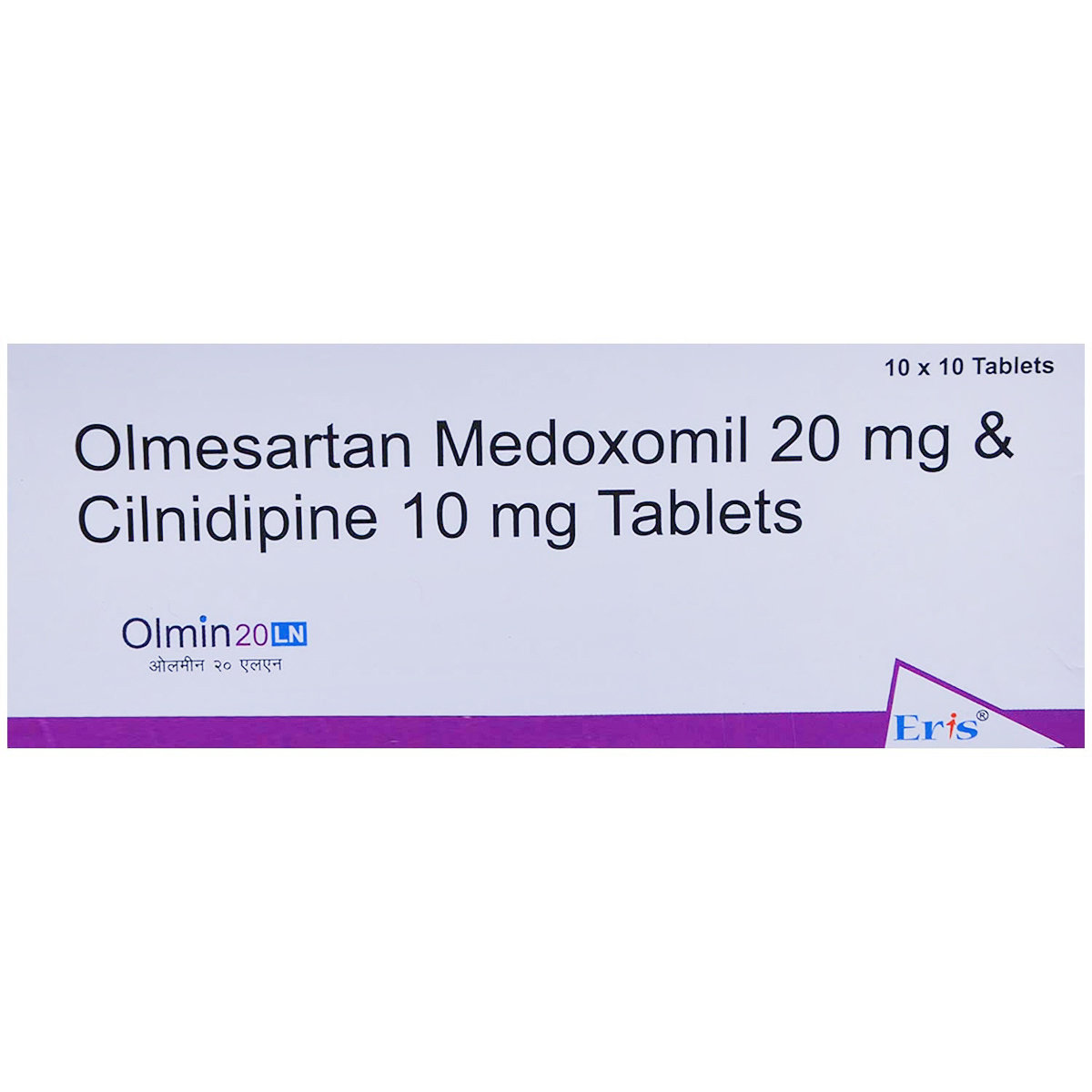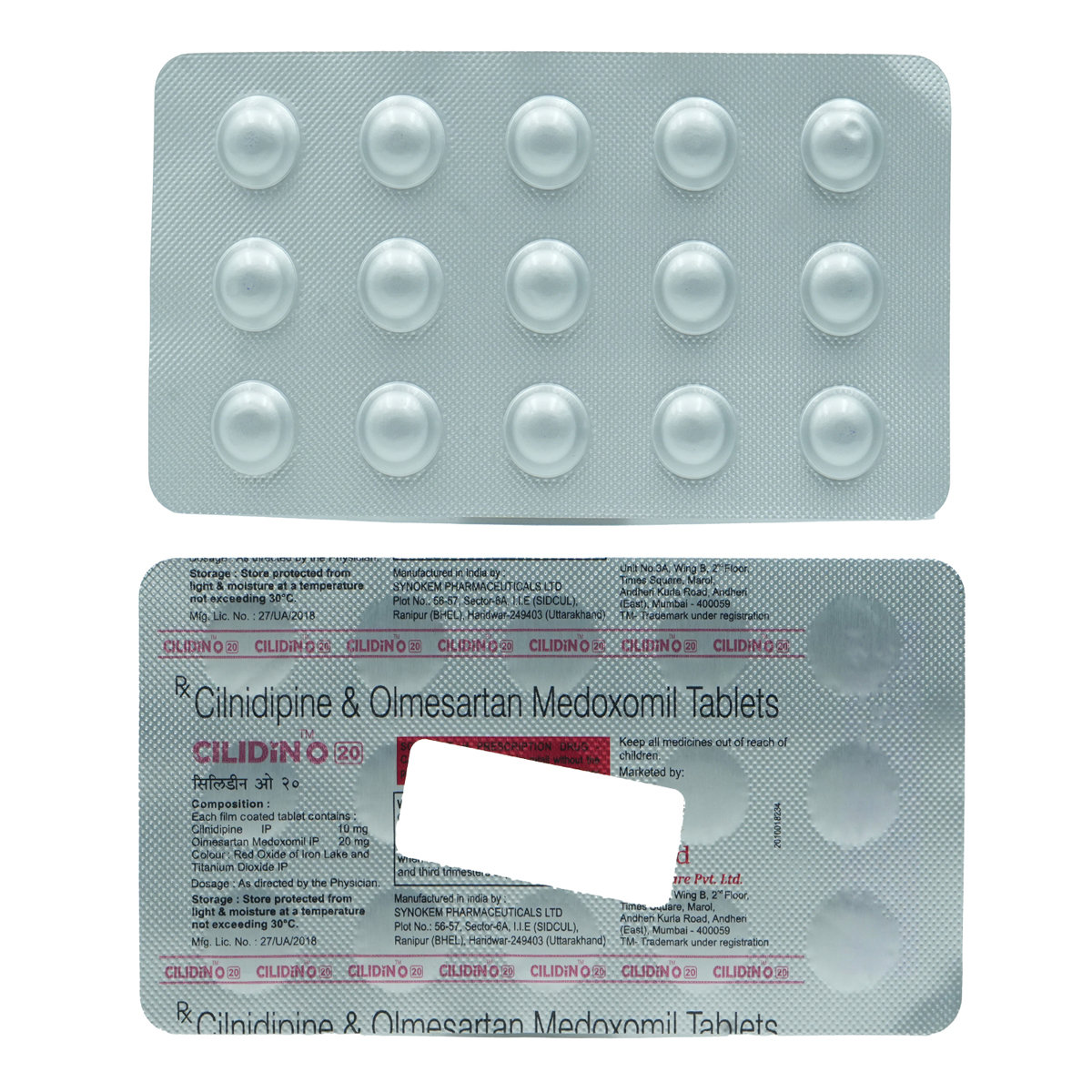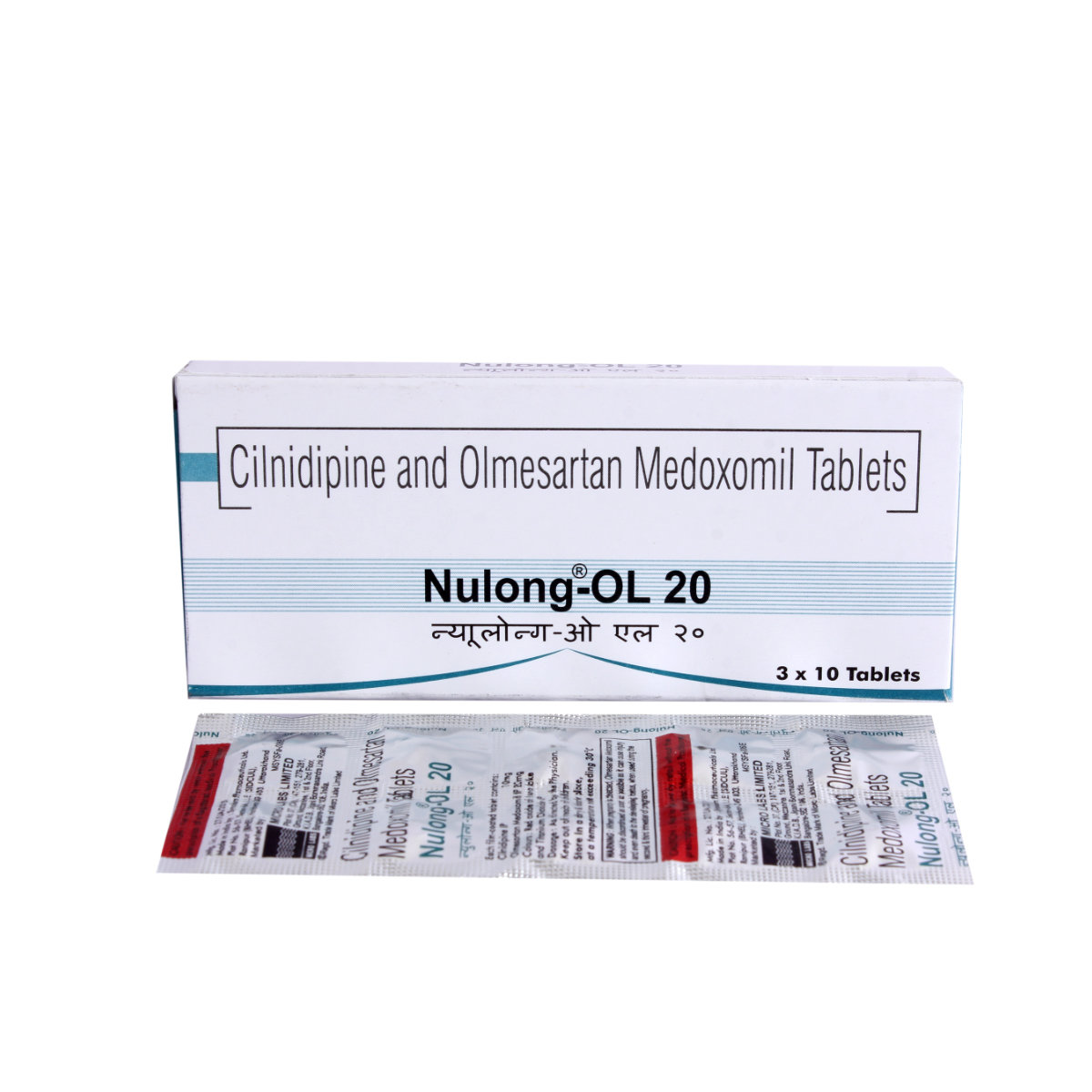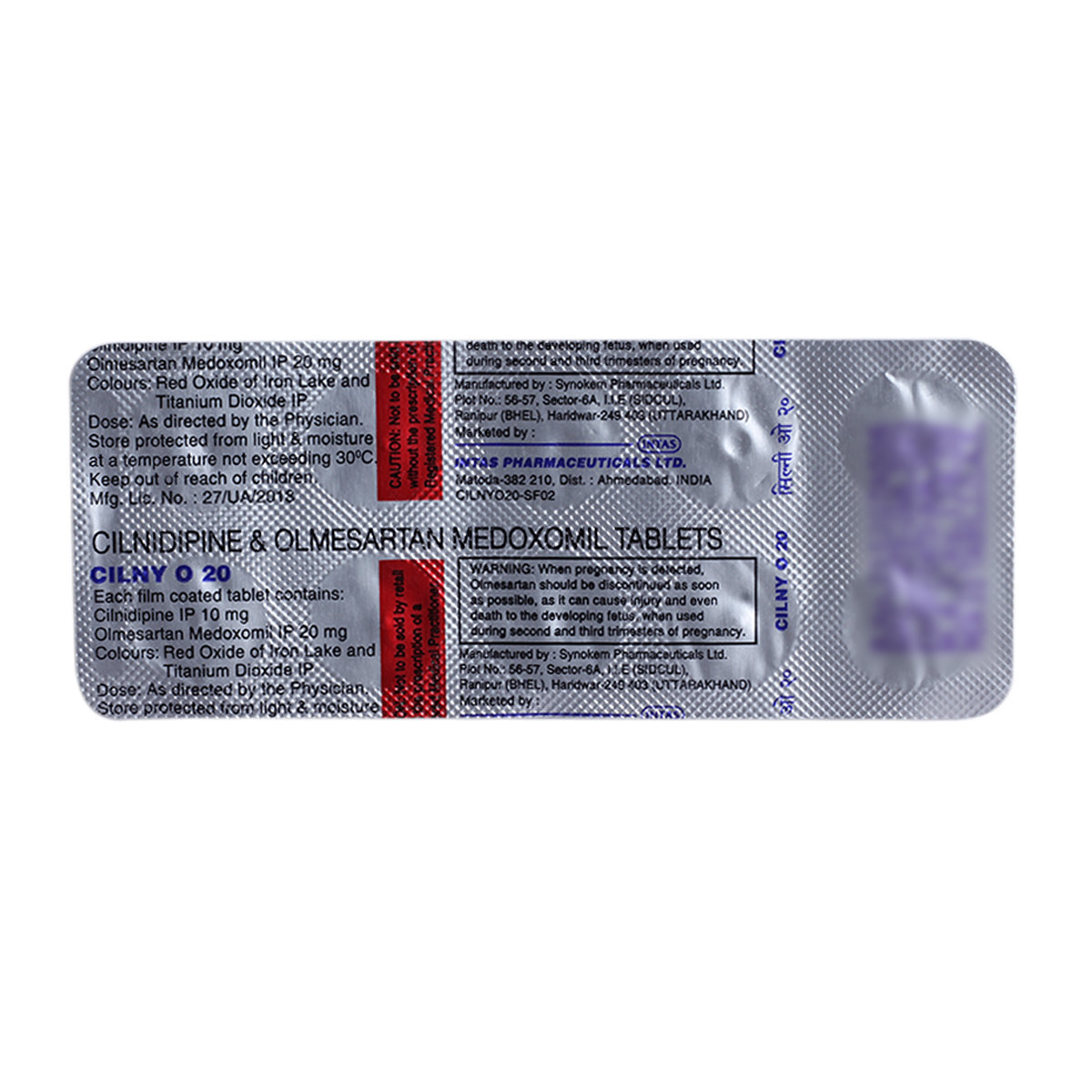TWIN OLMY 20MG TABLET 10'S
MRP ₹99
(Inclusive of all Taxes)
₹14.8 Cashback (15%)
Provide Delivery Location
Online payment accepted
 Prescription drug
Prescription drugWhats That
Composition :
Manufacturer/Marketer :
Consume Type :
Expires on or after :
Return Policy :
About TWIN OLMY 20MG TABLET
TWIN OLMY 20MG TABLET is a combination of blood pressure-lowering medicine, and novel calcium channel blockers primarily used to treat hypertension (high blood pressure). Hypertension or high blood pressure is a chronic condition in which the blood's force against the artery wall is high. As a result, it leads to heart disease, irregular heartbeat, and other complications.
TWIN OLMY 20MG TABLET contains Olmesartan medoxomil and Cilnidipine. This combination helps lower raised blood pressure effectively. Olmesartan works by blocking the hormone angiotensin, thereby relaxing blood vessels. This allows the blood to flow more smoothly and the heart to pump more efficiently. Cilnidipine blocks the activities of the calcium channels present in the blood vessels of the heart. This reduces the heart's workload and makes the heart more efficient at pumping blood throughout the body.
It would be best if you take TWIN OLMY 20MG TABLET with food. It should be swallowed whole with a glass of water. Do not chew, bite, or break it. Your doctor will advise you on the dose and duration based on your medical condition. You may experience headache, nausea, peripheral oedema (swelling of legs/hands), or dizziness in some cases. Most of these side effects of TWIN OLMY 20MG TABLET do not require medical attention and gradually resolve over time. However, if the side effects are persistent, reach out to your doctor.
Try not to stop taking this medicine of your own. Let your doctor know about this, as it may cause a rise in blood pressure and increase the risk of getting stroke and heart disease. TWIN OLMY 20MG TABLET should be taken with caution in patients with chest pain (angina), kidney disease, heart failure, low blood pressure (hypotension), and cardiogenic shock (sudden stopping of blood flow to the heart). If you are pregnant or breastfeeding, please tell your doctor so that the dosage of TWIN OLMY 20MG TABLET can be prescribed accordingly. Please inform your doctor if you are taking any other medicines or are allergic to this medicine.
Uses of TWIN OLMY 20MG TABLET
Directions for Use
Key Benefits
TWIN OLMY 20MG TABLET contains Olmesartan medoxomil and Clindipine, which together help in lowering raised blood pressure effectively. Olmesartan works by blocking the hormone angiotensin, thereby relaxing blood vessels. This allows the blood to flow more smoothly and the heart to pump more efficiently. Cilnidipine blocks the activities of the calcium channels present in the blood vessels of the heart. This reduces the heart's workload and makes the heart more efficient at pumping blood throughout the body. Thus, it helps to lower high blood pressure, reducing the chances of heart attack or stroke.
Storage
- Hydrate your body: Drink enough water to prevent dehydration and headaches.
- Calm Your Mind: Deep breathing and meditation can help you relax and relieve stress.
- Rest and Recharge: Sleep for 7-8 hours to reduce headache triggers.
- Take rest: lie down in a quiet, dark environment.
- Cold or warm compresses can help reduce tension.
- Stay Upright: Maintain good posture to keep symptoms from getting worse.
- To treat headaches naturally, try acupuncture or massage therapy.
- Over-the-counter pain relievers include acetaminophen and ibuprofen.
- Prescription Assistance: Speak with your doctor about more substantial drug alternatives.
- Severe Headaches: Seek emergency medical assistance for sudden, severe headaches.
- Frequent Headaches: If you get reoccurring headaches, consult your doctor.
- Headaches with Symptoms: Seek medical attention if your headaches include fever, disorientation, or weakness.
- Inform your doctor about dizziness symptoms. They may adjust your medication regimen or prescribe additional medications to manage symptoms.
- Follow your doctor's instructions for taking medication, and take it at the same time every day to minimize dizziness.
- When standing up, do so slowly and carefully to avoid sudden dizziness.
- Avoid making sudden movements, such as turning or bending quickly, which can exacerbate dizziness.
- Drink plenty of water throughout the day to stay hydrated and help alleviate dizziness symptoms.
- If you're feeling dizzy, sit or lie down and rest until the dizziness passes.
- Track when dizziness occurs and any factors that may trigger it, and share this information with your doctor to help manage symptoms.
Drug Warnings
TWIN OLMY 20MG TABLET should not be given to people allergic to TWIN OLMY 20MG TABLET , have low blood pressure (less than 90 mm of Hg), and also people who had a heart attack, kidney disease, liver disease, pregnant women or planning to get pregnant and breastfeeding women. Besides this, it is contraindicated in low blood pressure (hypotension), cardiogenic shock (sudden stopping of blood flow to the heart), and aortic stenosis (heart valve problem). TWIN OLMY 20MG TABLET can pass into breast milk, but its effect on the baby is not known. So, it is better to tell your doctor if you are taking TWIN OLMY 20MG TABLET and breastfeeding. Grapefruit juice and St. John's wort plant should not be consumed when taking TWIN OLMY 20MG TABLET as it is contraindicated. Drinking alcohol while using TWIN OLMY 20MG TABLET can cause you to have low blood pressure, so avoid intake of alcoholic beverages.
Drug-Drug Interactions
Drug-Drug Interactions
Login/Sign Up
Using aliskiren together with olmesartan may increase the risk of serious side effects (kidney problems, low blood pressure, and high potassium levels in the blood).
How to manage the interaction:
Taking Twin Olmy 20mg Tablet with Aliskiren is not recommended as it can cause an interaction, they can be taken if advised by a doctor. You should seek medical attention if you experience nausea, vomiting, weakness, confusion, tingling of the hands and feet, feelings of heaviness in the legs, a weak pulse, or a slow or irregular heartbeat.It is crucial that you continue to consume enough fluids while taking these medications. Do not stop using any medications without consulting a doctor.
Using Twin Olmy 20mg Tablet with Potassium chloride may increase Potassium levels in the blood.
How to manage the interaction:
Although taking Twin Olmy 20mg Tablet together with Potassium chloride may lead to an interaction but can be taken if prescribed by the doctor. However, consult the doctor if you experience nausea, vomiting, weakness, disorientation, tingling in your hands and feet, feelings of heaviness in your legs, a weak pulse, or a slow or irregular heartbeat. It is important to maintain proper fluid intake while taking these medications. Do not stop using any medications without talking to a doctor.
Coadministration of Twin Olmy 20mg Tablet with potassium iodide may increase potassium levels in the blood. (High potassium levels can cause hyperkalemia, which can lead to kidney failure, muscular paralysis, abnormal heart rhythm, and cardiac arrest in extreme cases).
How to manage the interaction:
Although taking Twin Olmy 20mg Tablet together with potassium iodide may lead to an interaction but can be taken if prescribed by the doctor. However, consult the doctor if you experience nausea, vomiting, weakness, disorientation, tingling in your hands and feet, feelings of heaviness in your legs, a weak pulse, or a slow or irregular heartbeat. It is important to maintain proper fluid intake while taking these medications. Do not stop using any medications without talking to a doctor.
Taking Twin Olmy 20mg Tablet with trimethoprim may increase potassium levels in the blood.
How to manage the interaction:
Although taking Twin Olmy 20mg Tablet with trimethoprim may lead to an interaction but can be taken if prescribed by the doctor. However, consult the doctor if you experience nausea, vomiting, weakness, disorientation, tingling in your hands and feet, feelings of heaviness in your legs, a weak pulse, or a slow or irregular heartbeat. Do not stop using any medications without talking to a doctor.
Twin Olmy 20mg Tablet when combined with benazepril may cause low blood pressure, kidney problems, and may increase potassium levels in the blood.
How to manage the interaction:
Although taking Twin Olmy 20mg Tablet with benazepril may lead to an interaction but can be taken if prescribed by the doctor. However, consult the doctor if you experience nausea, vomiting, weakness, disorientation, tingling in your hands and feet, feelings of heaviness in your legs, a weak pulse, or a slow or irregular heartbeat. Do not stop using any medications without talking to a doctor.
Taking lithium with Twin Olmy 20mg Tablet may significantly increase the blood levels of lithium .
How to manage the interaction:
Although taking Twin Olmy 20mg Tablet alongside lithium can lead to interaction, they can be taken if prescribed by a doctor. However, if you develop sleepiness, dizziness, confusion, loose stools, vomiting, muscular weakness, muscle incoordination, a shaking sensation, blurred vision, ringing in the ears, excessive thirst, and/or increased urination, consult a doctor. Do not stop using any medications without talking to a doctor.
Taking Twin Olmy 20mg Tablet with triamterene may increase potassium levels in the blood. (High potassium levels can cause hyperkalemia, which can lead to kidney failure, muscular paralysis, abnormal heart rhythm, and cardiac arrest in extreme cases).
How to manage the interaction:
Although taking Twin Olmy 20mg Tablet with triamterene may lead to an interaction but can be taken if prescribed by the doctor. However, consult the doctor if you experience nausea, vomiting, weakness, disorientation, tingling in your hands and feet, feelings of heaviness in your legs, a weak pulse, or a slow or irregular heartbeat. Do not stop using any medications without talking to a doctor.
When Twin Olmy 20mg Tablet is taken with captopril, it may cause low blood pressure, kidney problems, and may increase potassium levels in the blood.
How to manage the interaction:
Although taking Twin Olmy 20mg Tablet with captopril may lead to an interaction but can be taken if prescribed by the doctor. However, consult the doctor if you experience nausea, vomiting, weakness, disorientation, tingling in your hands and feet, feelings of heaviness in your legs, a weak pulse, or a slow or irregular heartbeat. Do not stop using any medications without talking to a doctor.
Coadministration of Twin Olmy 20mg Tablet with fosinopril may cause low blood pressure, kidney problems, and may increase potassium levels in the blood.
How to manage the interaction:
Although taking Twin Olmy 20mg Tablet together with fosinopril may lead to an interaction but can be taken if prescribed by the doctor. However, consult the doctor if you experience nausea, vomiting, weakness, disorientation, tingling in your hands and feet, feelings of heaviness in your legs, a weak pulse, or a slow or irregular heartbeat. Do not stop using any medications without talking to a doctor.
Coadministration of Twin Olmy 20mg Tablet with perindopril may cause low blood pressure, kidney problems, and may increase potassium levels in the blood.
How to manage the interaction:
Although taking Twin Olmy 20mg Tablet together with perindopril may lead to an interaction but can be taken if prescribed by the doctor. However, consult the doctor if you experience nausea, vomiting, weakness, disorientation, tingling in your hands and feet, feelings of heaviness in your legs, a weak pulse, or a slow or irregular heartbeat. Do not stop using any medications without talking to a doctor.
Drug-Food Interactions
Drug-Food Interactions
Login/Sign Up
Lentils, Orange Juice, Oranges, Raisins, Potatoes, Salmon Dried, Spinach, Tomatoes, Sweet Potatoes, Coconut Water, Beans, Beetroot, Broccoli, Bananas, Apricots, Avocado, Yogurt
How to manage the interaction:
Coadministration of potassium-containing salt substitutes with Olmesartan medoxomil and Cilnidipine may cause high levels of potassium in blood. Avoid potassium-containing salt substitutes while being treated with Olmesartan medoxomil and Cilnidipine.
Diet & Lifestyle Advise
- Keep your weight under control with a BMI of 19.5-24.9.
- Do regular physical activity or exercise for at least 150 minutes per week, or about 30 minutes most days of the week. Doing this can help lower your raised blood pressure by about 5 mm Hg.
- Opt for a diet rich in whole grains, fruits, vegetables and low-fat dairy products.
- Limit sodium chloride (table salt) intake in your daily diet to 2300 mg per day or less than 1500 mg is ideal for most adults.
- If you are taking alcohol, then only one serving for women and two servings is advisable.
- Quitting smoking is the best strategy to lower the risk of heart disease.
- Avoid chronic stress, as it can raise your blood pressure. Try to enjoy and spent time with your loved ones to cope with stress and practice mindfulness techniques.
- Try to include heart-healthy omega-3 fatty acid-containing food drinks in your daily diet. You can also use low-fat cooking oil like olive oil, soybean oil, canola oil, and coconut oil to lower your elevated blood pressure.
Side Effects of TWIN OLMY 20MG TABLET
- Dizziness
- Headache
- Peripheral oedema (swelling of legs/hands)
- Flushing (skin reddening)
- Rash
- Taste change
- Upset stomach
Habit Forming
Therapeutic Class
All Substitutes & Brand Comparisons
RX
Out of StockCilacar O 20 Tablet 10's
J B Chemicals & Pharmaceuticals Ltd
₹89
(₹8.01 per unit)
10% CHEAPERRX
Out of StockTwin Olmy 20 Tablet
Zydus Cadila
₹99
(₹8.91 per unit)
RX
Olcure CN 10 mg/20 mg Tablet 15's
Hbc Life Sciences Pvt Ltd
₹175.5
(₹10.53 per unit)
18% COSTLIER
Drug-Diseases Interactions
Drug-Diseases Interactions
Login/Sign Up
FAQs
In case you have missed a dose of TWIN OLMY 20MG TABLET , you are advised to take it as soon as you remember. However, try not to miss a dose in the first place; if it's time to take your next dose, then do not take both doses together. Take only one dose; a double dose of TWIN OLMY 20MG TABLET will lead to low blood pressure.
It is advised to continue your medicine even after your blood pressure is under control or becomes normal, as blood pressure can be increased at any time. If you have a persistent headache, please consult your doctor immediately.
Yes, TWIN OLMY 20MG TABLET is known to cause ankle swelling. Please try to keep your feet up when sitting for long hours. If the problem persists still, consult your doctor and do as advised.
Drug-Drug Interactions Checker List
- DROSPIRENONE
- RAMIPRIL
- ASPIRIN
- ALISKIREN
- VERAPAMIL
- BENAZEPRIL
- LISINOPRIL
Special Advise
Monitor your blood pressure daily and if there is too much fluctuation, immediately contact your doctor.
Disease/Condition Glossary
Blood pressure: It is the measurement of the force that our heart uses to pump blood to all body parts. Hypertension is a chronic condition when blood pressure is too high. This condition can lead to hardened arteries (blood vessels), decreasing the blood and oxygen flow to the heart. Raised blood pressure can cause chest pain (angina) and heart attack (when the blood supply to the heart is blocked). High blood pressure also causes brain damage (stroke) and kidney failure. High blood pressure can be diagnosed with the help of a blood pressure monitor or sphygmomanometer. Systolic pressure is the pressure when the heart pumps blood out. On the other hand, diastolic pressure is when your heart is at the resting stage between heartbeats. If your blood pressure is 140/90 mm of Hg, it means the systolic pressure is 140 mm of Hg, and diastolic pressure is 90 mm of Hg. Ideal blood pressure should be between 90/60 mm of Hg and 120/80 mm of Hg.

Have a query?
Alcohol
Safe if prescribed
TWIN OLMY 20MG TABLET can lower your blood pressure causing dizziness and drowsiness. It can also cause orthostatic hypotension (sudden fall in blood pressure while standing). So try to avoid intake of TWIN OLMY 20MG TABLET with alcoholic beverages.
Pregnancy
Consult your doctor
TWIN OLMY 20MG TABLET is pregnancy risk category D medicine which may cause harm to the fetus or unborn baby. So, when pregnancy is detected, discontinue TWIN OLMY 20MG TABLET as soon as possible and consult the doctor.
Breast Feeding
Consult your doctor
TWIN OLMY 20MG TABLET passes into the breast milk. But its effect on the baby is not clear. However, contacting the doctor before intake of TWIN OLMY 20MG TABLET is advisable.
Driving
Safe if prescribed
TWIN OLMY 20MG TABLET may cause side effects that could affect your ability to drive. Taking TWIN OLMY 20MG TABLET may lower your blood pressure
Liver
Consult your doctor
TWIN OLMY 20MG TABLET to be taken with caution, especially if you have a liver disease history. Your doctor will have to change the dosage depending on your medical condition and your reaction to treatment.
Kidney
Consult your doctor
TWIN OLMY 20MG TABLET is not recommended in patients with chronic kidney disease (severe renal impairment). Please inform your doctor if you had a history of kidney disease. Your doctor may adjust the dose if required based on your condition.
Children
Safe if prescribed
TWIN OLMY 20MG TABLET is not recommended in children. The safety and efficacy of TWIN OLMY 20MG TABLET in children have not yet been established
Recommended for a 30-day course: 3 Strips





